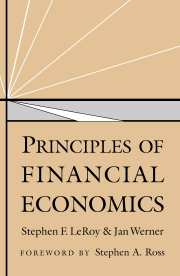Book contents
- Frontmatter
- Contents
- Foreword
- Preface
- Part One Equilibrium and Arbitrage
- Part Two Valuation
- Part Three Risk
- Part Four Optimal Portfolios
- Part Five Equilibrium Prices and Allocations
- Part Six Mean-Variance Analysis
- Part Seven Multidate Security Markets
- Part Eight Martingale Property of Security Prices
- 25 Event Prices, Risk-Neutral Probabilities, and the Pricing Kernel
- 26 Security Gains as Martingales
- 27 Conditional Consumption-Based Security Pricing
- 28 Conditional Beta Pricing and the CAPM
- Index
25 - Event Prices, Risk-Neutral Probabilities, and the Pricing Kernel
Published online by Cambridge University Press: 05 September 2012
- Frontmatter
- Contents
- Foreword
- Preface
- Part One Equilibrium and Arbitrage
- Part Two Valuation
- Part Three Risk
- Part Four Optimal Portfolios
- Part Five Equilibrium Prices and Allocations
- Part Six Mean-Variance Analysis
- Part Seven Multidate Security Markets
- Part Eight Martingale Property of Security Prices
- 25 Event Prices, Risk-Neutral Probabilities, and the Pricing Kernel
- 26 Security Gains as Martingales
- 27 Conditional Consumption-Based Security Pricing
- 28 Conditional Beta Pricing and the CAPM
- Index
Summary
Introduction
In this chapter we present two closely related representations of the valuation functional – one by event prices and the other by risk-neutral probabilities – and a representation of the payoff pricing functional by the pricing kernel. These representations are the analogues of those of the valuation functional and the payoff pricing functional of the two-date model of Chapters 6 and 17.
Event prices are the multidate counterpart of state prices in the two-date model. The existence of strictly positive (positive) event prices indicates the absence of arbitrage (strong arbitrage). The uniqueness of event prices indicates that markets are dynamically complete. Event prices can be calculated as a solution to linear equations. Once event prices are known, the price of any payoff can be found without identifying a portfolio strategy that generates that payoff.
Risk-neutral probabilities are event prices rescaled by discount factors. The existence of a pricing kernel is a consequence of the Riesz Representation Theorem.
Event Prices
If security markets are dynamically complete, then the payoff pricing functional q is defined on the entire contingent claim space Rk, and the event price q(ξ) is defined as the price q(e(ξ)) of the Arrow security e(ξ) (see Chapter 23). If security markets are incomplete, then the asset span is a proper subspace of the contingent claim space, and some Arrow securities cannot be priced using the payoff pricing functional.
- Type
- Chapter
- Information
- Principles of Financial Economics , pp. 247 - 257Publisher: Cambridge University PressPrint publication year: 2000

